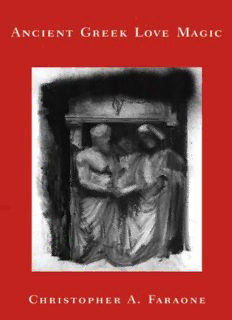
Ancient Greek Love Magic PDF
Preview Ancient Greek Love Magic
Ancient Greek Love Magic (cid:2) (cid:3) (cid:3) (cid:4) (cid:4) (cid:4) (cid:4) (cid:4) (cid:4) (cid:4) (cid:4) (cid:4) (cid:4) (cid:4) (cid:4) (cid:4) Ancient Greek (cid:4) (cid:4) (cid:4) (cid:4) (cid:4) (cid:4) (cid:4) (cid:4) (cid:4) (cid:4) Love Magic (cid:4) (cid:4) (cid:4) (cid:4) (cid:4) (cid:4) (cid:4) (cid:4) (cid:4) (cid:4) (cid:4) (cid:4) (cid:4) (cid:4) (cid:4) (cid:4) (cid:2) (cid:4) (cid:4) (cid:4) (cid:4) (cid:4) (cid:4) (cid:4) (cid:4) (cid:4) (cid:4) (cid:4) (cid:4) (cid:4) (cid:4) (cid:4) (cid:4) (cid:4) (cid:4) (cid:4) (cid:4) Christopher A. Faraone (cid:4) (cid:4) (cid:4) (cid:4) (cid:4) (cid:4) (cid:4) (cid:4) (cid:4) (cid:4) (cid:4) (cid:4) (cid:4) (cid:4) (cid:4) (cid:4) (cid:4) (cid:4) (cid:4) (cid:4) (cid:4) (cid:4) (cid:4) (cid:4) (cid:4) (cid:4) (cid:4) (cid:4) (cid:4) (cid:4) (cid:4) (cid:4) (cid:4) (cid:4) (cid:4) (cid:4) (cid:4) (cid:4) (cid:4) (cid:4) (cid:4) (cid:4) (cid:4) (cid:4) (cid:4) (cid:4) (cid:4) (cid:4) Harvard University Press (cid:4) (cid:4) (cid:4) (cid:4) (cid:4) (cid:4) Cambridge, Massachusetts (cid:4) (cid:4) (cid:4) (cid:4) London, England (cid:4) (cid:4) (cid:4) (cid:4) (cid:4) (cid:4) (cid:4) (cid:4)(cid:4) (cid:4)(cid:4) (cid:2) (cid:2) Copyright © 1999 by the President and Fellows of Harvard College All rights reserved Printed in the United States of America Second printing, 2001 First Harvard University Press paperback edition, 2001 library of congress cataloging-in-publication data Faraone, Christopher A. Ancient Greek love magic / Christopher A. Faraone. p. cm. Includes bibliographical references and indexes. ISBN 0-674-03320-5 (cloth) ISBN 0-674-00696-8 (pbk.) 1. Magic, Greek. 2. Love—Miscellanea—History. I. Title. BF1591.F37 1999 133.4(cid:2)42(cid:2)0938—dc21 99-10676 For Susan sê gfir Ãn seautá tfi f©rmaka Æxeiv (Plutarch Moralia 141c) Contents Preface ix 1 Introduction 1 1.1 The Ubiquity of Love Magic 5 1.2 Definitions and a New Taxonomy 15 1.3 The Advantages of a Synchronic and Comparative Approach 30 2 Spells for Inducing Uncontrollable Passion (Eros) 41 % 2.1 If ErÃs Is a Disease, Then Erotic Magic Is a Curse 43 2.2 Jason’s Iunx and the Greek Tradition of Agoge Spells 55 % % 2.3 Apples for Atalanta and Pomegranates for Persephone 69 2.4 The Transitory Violence of Greek Weddings and Erotic Magic 78 3 Spells for Inducing Affection (Philia) 96 3.1 Aphrodite’s Kestos Himas and Other Amuletic Love Charms 97 3.2 Deianeira’s Mistake: The Confusion of Love Potions and Poisons 110 3.3 Narcotics and Knotted Cords: The Subversive Cast of Philia Magic 119 4 Some Final Thoughts on History, Gender, and Desire 132 4.1 From Aphrodite to the Restless Dead: A Brief History of the AgÃgÁ Spell 133 4.2 Courtesans, Freedmen, and the Social Construction of Gender 146 4.3 Aelian’s Tortoises and the Representation of the Desiring Subject 160 Contents (cid:2) viii Glossary 175 Abbreviations 179 Bibliography 183 Subject Index 205 Index of Foreign Words 213 Index of Passages from Ancient Authors 217 Index of Magical Texts 221 Preface Despite the well-documented separation and polarization of male and female spheres of action in ancient Greece, scholars traditionally treat love charms as one undifferentiated mass of data and assume that individuals of either gender could without discrimination use any type of charm they wished on any victim they so chose. I offer here a survey of ancient Greek love magic and a new bipolar taxonomy based mainly on the genders of the agents and their victims: those rituals used mainly by men to instill erotic passion (erôs) in women and those used primarily by women to maintain or increase affection (philia) in men. This taxonomy is not procrustean, however, and in the final chapter I discuss several important deviations from it, suggesting that most of the apparent anomalies in the gender of the person using a spell are not in fact anomalies at all, but rather give us some new and interesting insights into how ancient Greek ideas about gender were socially constructed. In the case of philia-producing magic, for instance, I show how freedmen and other socially subordinate males are constructed as female, according to widespread patriarchal notions of fe- male inferiority. Conversely I argue that courtesans and prostitutes employ aggressive erotic magic—usually the purview of males—because, as autonomous operators free to indulge in their passions, these women are constructed as male in Greek culture. Finally, I discuss of how the Greeks constructed the victims of these spells as desiring subjects. My conclusions here may surprise some readers, as they did, indeed, surprise me, for they call into question the widespread orthodoxy of what we might call the “misogynist” model of Greek culture, which generally attributes men’s mis- treatment and control of women to their fears that women are “naturally” lascivious and are therefore a constant threat to male schemes for the orderly transference of property by means of betrothal and marriage. I argue to the contrary that the evidence assembled here suggests the exist- ence of another, competing set of cultural assumptions, which I call the “misandrist” model, according to which men are the “naturally” lascivious
Description: